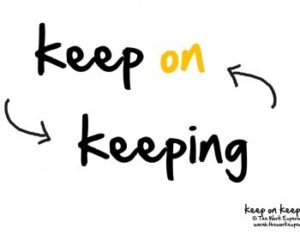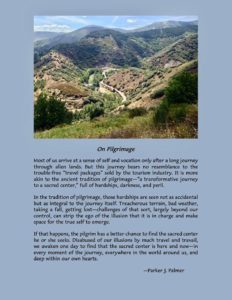“Keeping on” surely needs to happen in these long odd days. But the important question to me is: “How?!” How do we hold on to hope, hold on to faith, hold on to loving one another when every day brings a new outrage?
My blogging work brings me into contact with a wide range of cyberspace acquaintances and I see much anger everywhere I turn. Anger, impatience, blame, antagonism, resentment, rage. How can we sleep at night when such emotions constantly roil within us? How can we maintain our most precious relationships when we disagree deeply? How can we find positive energy to address the challenges of our nation when negative emotions paralyze us? How can we keep on keeping on?
Here are just a few possibilities:
We remember the difference between intellect and emotions.
Emotions are crucial to our well being. They function as signals, pointing us toward realities in the deep places of our soul. Emotions are gut reactions, quick feedback that are supposed to get our attention so we will recognize the importance of what is going on within us. Emotions are like a fever. Fevers are not “bad” in themselves; rather they let us know that an infection is spreading somewhere that we cannot see.
Our emotions are not “bad” either. They just are. When we use our emotions as signposts, then we can take time to stop and ponder: “What is going on here?” When we follow the path of the signal, we can figure out if our anger is coming from some unrecognized fear or some sense of helplessness or some perceived threat. Anger is a normal, necessary and healthy part of the grief process. And, of course, a feeling of anger is a reasonable response to injustice.
But still, feelings are feelings and we do well not to let them overwhelm us and take over our lives. Emotions sharpen our intellect so we can develop greater self-awareness and understand what these triggers mean to us. That’s when our emotions can fuel our actions with positive, focused energy instead of paralyzing us with free-floating, negative energy.
We remember to be active.
Strong emotions such as anger generate physical realities within our bodies; that’s why we want to yell, scream and throw things. But when we take our anger as a signal and bring our intellect into partnership with our emotions, we can get a handle; we can remember to funnel that anger energy into safe and productive channels. We might go for a brisk walk or get ourselves to the gym. We could pound on a keyboard or scribble in a journal and let words spill out of our souls (words that would be damaging to someone we love if we said them out loud!) We might need to cry and let the tears flow unchecked. Or we could march and join with others in focused protest against injustice.
Strong emotions need physical outlets and our intellect is what helps us choose which activity would be most healing in any given situation.
We remember to be still.
When anger is not named, confronted and channeled, it seethes and broods and creates a very real chemical imbalance in our bodies. Anger turned inward can develop into depression so it is vital that we make time to allow our bodies to relax and release that simmering anger energy.
Sometimes the “stillness” is literal. We sit in a quiet room and breathe, listening to our bodies. We soak in a warm bath while candles flicker. We watch trees dance or birds flutter or streams tumble.
Sometimes the stillness is metaphorical. In my Judeo-Christian tradition, there is a powerful little scripture that says: “Be still and know that I am God.” This kind of “being still” means trusting that – in some mystery that is beyond my control – things will work out. The stillness and peacefulness of having faith, of truly believing that the “arc of history bends toward justice” can give us a balance we can’t get anywhere else.
But this stillness of which I speak does not mean a “pull-the-covers-over-my-head” kind of hiding from the realities of life. Think of stillness not so much as escape but rather a passing of the baton while you catch your breath. We are in a marathon, much like the Abolitionists and the Civil Rights activists. Figuring out how to live in balance is what can empower us to keep on keeping on.
We remember to love.
Again, my own Christian faith reminds me that the Christ of our faith kept on keeping on because of love.
Love of God. Love of neighbor. And even love of enemy.
Love allows us pray for, to care about those who are oppressed, abused, endangered, enslaved. To feel deep compassion for their plight and to see ourselves as part of a spiritual community that can help carry their burdens. To become a vibrant part of the cosmic community that shares their struggles. This may be painful but numbing ourselves to the pain of the world and hardening our hearts is much more damaging to us in the long run. Love allows us to see ourselves as one human family.
Love also allows us to pray for the oppressors, the “enemies.” More often than not, abusers have been victims of abuse so we can pray and hope that they will find their way out of the vicious cycles that entrap them and endanger others.
Love even helps us pray for those who misunderstand, who make mistakes, who lose their balance, who forget how to love neighbor because they are so wrapped up in themselves. But there is another important angle here and that is honestly recognizing ourselves as being guilty of this same bentness which we so dislike in some neighbors.
The biblical “love your neighbor” challenge also adds this: “love your neighbor as you love yourself.” Then there is the challenge to “judge not lest you be judged.” And the classic plea from the Lord’s Prayer: “forgive us our sins as we forgive the sins of others.” Not to mention the Golden Rule which is articulated in almost every other faith tradition: “Treat others they way you want to be treated.”
All these admonitions demonstrate how my neighbor and I are deeply connected. Often what I see in my neighbor is what I refuse to see in myself. If we can grow to truly see ourselves as one human family – the good, the bad and the ugly – then our greater maturity allows us to recognize the timeless wisdom of Pogo the Possum: “We have met the enemy and he is us.” Love of neighbor along with love of self gives us patience and grace to forgive – both the other and ourselves.
A good balance between head and heart, healthy activity, restorative stillness, the power of love: here are some ways for us to find positive energy to heal the heart of our nation. Here are some strategies to help us keep on keeping on.
Other writers also continue to remind us to tend our souls and keep our balance during these marathon movements for justice.
Jim Rigby, a progressive pastor in Austin TX
In Justice Movement, We Cannot Neglect our Souls by Reesheda Graham-Washington and Shawn Casselberry.
Father Richard Rohr and the Center for Action and Contemplation

And one of my favorites, Parker Palmer
Find him on Facebook
“Keep on Keeping On” image by Sarah
I cant sleep thinking of children. Im afraid we are going to get busy with life and let the concern diminish. So I bought some child paraphernalia and Ive tied in on my tree as I leave my driveway each day until those families are reunited. Bring something over and hang on tree with a prayer. Corner of 20th and Cherry. Im working on it. I have ladder and someone to hold it will keep me from breaking my foolish naive childish neck. But this stuff will be added to the tree. Someone will ask why? And I will tell them. I will not forget. Bring a trinket and add to it.